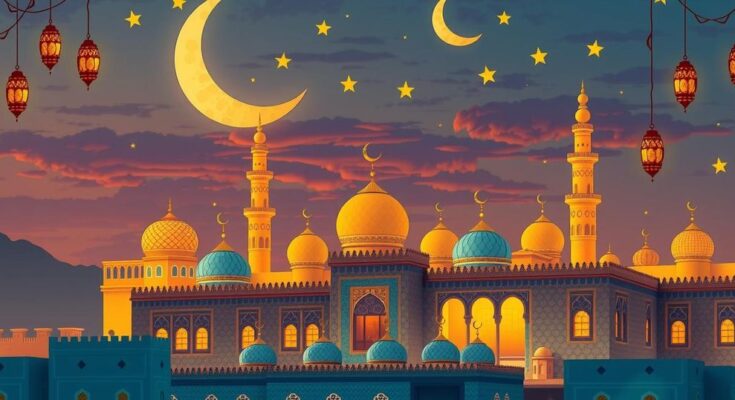Morocco prepares for Ramadan 2025, anticipated to begin in late February or early March. The Ministry of Islamic Affairs will confirm the date following moon sighting. Local governments are implementing measures to ensure adequate supply of essential goods while monitoring prices to protect citizens’ purchasing power amid economic challenges tied to drought.
Morocco is poised to embrace the holy month of Ramadan, anticipated to begin either at the end of February or the start of March 2025. The official date remains pending confirmation from the Ministry of Islamic Affairs, contingent upon moon sighting by religious authorities. In preparation, various Moroccan provinces are implementing strategies to guarantee ample supplies of consumer goods in local markets.
Under royal directives, the governor of Settat Province chaired a meeting to discuss the necessary preparations for Ramadan 2025. This meeting follows a circular from the Minister of Interior, Abdelouafi Laftit, issued on January 7, highlighting the importance of securing essential goods and services during the holy month. The objective is to enhance monitoring of prices, quality, and supply of consumer goods to uphold citizens’ purchasing power and ensure their health and safety.
The provincial government emphasized that these measures are aimed at alleviating the impact of economic challenges, notably those arising from consecutive years of drought. The government’s concern is valid as these climatic conditions have adversely affected the availability of agricultural and food products in local markets, particularly cereal production and meat supplies. Locals are increasingly aware that Ramadan typically sees a surge in demand for food products, altering consumption patterns significantly.
To address potential market imbalances, the Interior Ministry regularly deploys committees tasked with monitoring commodity prices during Ramadan. This proactive approach underscores the importance of maintaining economic stability amidst the unique demands of the holy month. Ramadan, observed in the ninth month of the Islamic calendar, involves fasting from dawn until sunset for periods lasting 29 to 30 days, subject to the crescent moon sighting, with variations in fasting hours occurring based on regional time zones.
Morocco’s preparations for Ramadan 2025 focus on ensuring a sufficient supply of essential goods while addressing economic challenges posed by prolonged droughts. Measures include proactive monitoring of prices and quality of commodities, aimed at safeguarding citizens’ purchasing power. The collaboration between various provincial authorities emphasizes the significance of maintaining market stability during this notable month, which inherently sees an increase in consumer demand.
Original Source: www.moroccoworldnews.com




